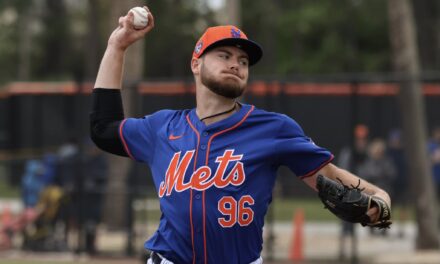The idea of front-loading contracts is simple. You pay a player for his good years and as the contract goes on, the salary decreases. The concept is not meant to save anyone money and it does decrease short term payroll flexibility, but can benefit a team in the latter years of a deal. I am obviously not the first person to suggest this idea, but you will see why I pose the question as I go on.
The problem with most long term MLB contracts these days is that they progressively increase in salary as the years in the contract go up. (I consider anything 4 years and up to be long term, for the record.) The general logic is that as a player gets older, he finds himself in decline and more susceptible to injury. Free agency is a player’s market – for the most part, they determine the general range of money being put into the contracts that they are offered. Once you come to terms with that, understand that players are looking for longer contracts than they ever have before.
I am not looking to save the Wilpons any money at all. However, if they are going to be stingy and place payroll limitations on the team, front-loading a contract is a way around it that won’t leave the team in a troublesome situation in the future. Here are a few examples of some contracts that would’ve gone differently if front loaded. I cite a few examples to show some players that will be earning their biggest paychecks in years that will most likely have a decrease in performance:
- Cliff Lee: 5/125. Lee is an excellent pitcher and there is no question about that but he received this contract when he was 32 and it pays him more as it goes along. In 2015, when Lee is 37, he will be making $25 Million.
- Barry Zito: 7/126. Another contract that increases as the time passes. When he’s 35, he’ll be making $20 Million.
- Ryan Howard: 5/125. Howard is already in decline and will be making $25 Million in 2016 when he is 37.
- Johan Santana: 6/138. I hate to bring this one up, but in 2013, he will be making $25.5 Million – at age 34.
- Chase Utley: 7/85. Utley will be making $15 Million in 2013 at age 35.
Alex Rodriguez may have a horrible albatross of a contract, but the Yankees did do something interesting with it. During 2009/2010, Rodriguez was paid $32 Million and although he’ll be under contract at age 42, he’ll be making $20 Million. Obviously, $20 MM is not chump change, but think about that for a second. That’s an odd way to front load a contract, but it begins the conversation nicely.
Regarding our front office, there’s no way that you can convince me that they unable to compete and build up a structure for the future at the same time, like so many have said. To do that, not only will they have to draft and develop well, explore the International markets, and acquire good players via trade, but they will also have to sign free agents as well. It’s inevitable – we will never have every roster position addressed with an in-house solution.
The way the market dictates value these days, if we don’t give someone like CJ Wilson the money or years he demands, someone else will. I’m not going to sit here and say that if he demands 8 years and $200 million, that we should give it to him. That’s an extreme situation and has no place in this discussion.
CJ Wilson was the reason I started pondering the idea of front-loading contracts in the first place today. He’s 30 right now and he’s seeking a contract along the lines of 5 years/$100 MM. He’s likely to get something closer to 5 years/$80 Million or possibly even a 4 year deal unless he amps up his performance in the postseason. This is what a 5/$80 contract will probably look like versus what I think front-loading could do for it:
- 2012: $12 MM vs. $22 MM
- 2013: $13 MM vs. $21 MM
- 2014: $16 MM vs. $21 MM
- 2015: $18 MM vs. $ 9 MM
- 2016: $21 MM vs. $ 7 MM
It looks like a weird breakdown, but think about this for a second… Both contracts add up to the same amount of money committed to the player, and although the front-loaded contract reduces the payroll flexibility here and now, it works to satisfy the crowd that worries about overpaying a player when he doesn’t deserve it.
The likelihood is that Wilson, or any pitcher at his age with his skill set, will produce much more in the front-end of his contract than the back end. In this way, when the Wheeler/Harvey/Familia/(Insert Name of Mets Pitching Prospect Here) train arrives, there’s not much of a problem in terms of money committed to players that aren’t performing.
Plus if things really get bad ala Oliver Perez, I’m not above cutting bait on a player and eating some money.
Front-loading minimizes the long term risks and allows him to be paid more accordingly.
I’m not saying we need to go out and sign CJ Wilson to this contract or any other player – but I am using him as an example. If we continue the process of offering contracts the way we always do, and this may come handy in terms of signing Jose Reyes, we’re going to end up like the Philles in a few years – stuck with declining players and bad contracts of high value.
I’m not interested in saving the Wilpons money, but I am interesting in competing and building at the same time.














